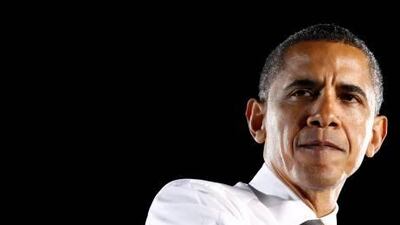WASHINGTON // It is perhaps not surprising that at Ben's Chili Bowl, the Washington eatery famed for its half-smokes and chili, staff still retain huge affection for Barack Obama.
They do so in spite of the president's diminished standing nationwide, which is cited as a major reason for the losses his Democratic Party look set to incur in next week's mid-term Congressional elections.
The diner was one of the first public stops Mr Obama made when he returned to Washington before being sworn in as president in January 2009, and the presidential seal hangs proudly over the table where he had lunch that Saturday.
"I am a big fan of Obama," said Sonya Ali, co-owner of the restaurant. "But people had unrealistic expectations and they aren't giving him time."
From an approval rating in the high 60s to low 70s when he first took office, Mr Obama's popularity has plummeted. According to the latest Harris Interactive survey, his approval rating is now as low as 37 percent, with two-thirds of Americans holding a negative perception of Mr Obama's performance.
Republicans have taken full advantage and - with some polls predicting that Democrats could lose as many as 48 seats in the House of Representatives and up to 10 in the Senate and thus take control of both houses of Congress to good effect.
In many races across the country, a Democratic candidate's support for Obama-backed legislation or policies has been turned against them in a barrage of TV ads for Republican candidates.
Typical of such ads, Republicans in Colorado describe the Democratic Senate incumbent as "fighting for Obama", and the commercial's announcer concludes, "We need a senator for us, not them."
Mr Obama has come to be seen as a vote loser to such an extent that many Democrats have distanced themselves as far as possible. Frank Caprio, the Democratic candidate for the governorship of Rhode Island, who failed to secure presidential endorsement, even went so far as to tell Mr Obama that he could "take his endorsement and really shove it".
Mr Obama has responded by hitting the campaign trail, touring the country to invigorate a Democratic base that is seen as having lost the enthusiasm that carried him overwhelmingly to the presidency in 2008. But experts say he is fighting a perfect storm that combines a traditional midterm swing away from the president's party with an economy that has failed to improve over the past two years.
"It's not complicated. When unemployment rates go up, presidential approval rates go down," said James Lindsay, senior vice president of the Council on Foreign Relations
Since 2008, the US unemployment rate has gone from 7.2 to 9.6 per cent.
Mr Lindsay said that while there is a "tendency in the blogosphere" to focus on what Mr Obama has or hasn't done, historically the president's party loses seats in Congressional elections and more seats if the unemployment rate is high.
Moreover, Mr Obama faced one of the steepest recessions in recent US history when he took office, and Mr Lindsay said it was "entirely predictable" that he couldn't sustain his level of popularity.
"The problem for President Obama was that he failed to persuade large numbers of Americans that the steps he was taking were going to improve their lives," he said. "This is why you have this odd disjuncture where, in terms of number and significance of bills passed, Obama has been very successful… [But] if you ask most Americans about those bills they have a decidedly negative view."
The negative TV ads, the slump in Mr Obama's popularity as well as the rise of the far-right Tea Party and its anti-federal government message are explained by the faltering economy rather than any more fundamental change in American politics, said Thomas Mann of the Brookings Institution, a Washington-based think tank
"Obama's problems and those of the Democratic Party are almost entirely a consequence of a dreadful economy with very high unemployment and deep pessimism about the future. The Tea Party movement was stimulated by very bad economic times, and it will fade if and when the economy recovers," he said.
That Democrats will lose seats in Congress next week is not in doubt, though whether they will lose control of both houses, as some polls predict, is by no means certain. Some polls show Democrats retaining control over the Senate with the slimmest of majorities.
Either way, legislative gridlock is likely with the next Congress, and Mr Obama will find his room for manoeuvre curtailed.
"He will be weakened for certain and forced to rely more on executive actions and the administrative process to advance his policy objectives," Mr Mann said. "[P]artisan wars and government shutdowns are likely to dominate the next Congress."
If that should happen, said James Dolo, 45, a cook at Ben's Chili Bowl, the Democrats have only themselves to blame.
"They had control of both houses. They should have been more supportive of Obama's policies."

